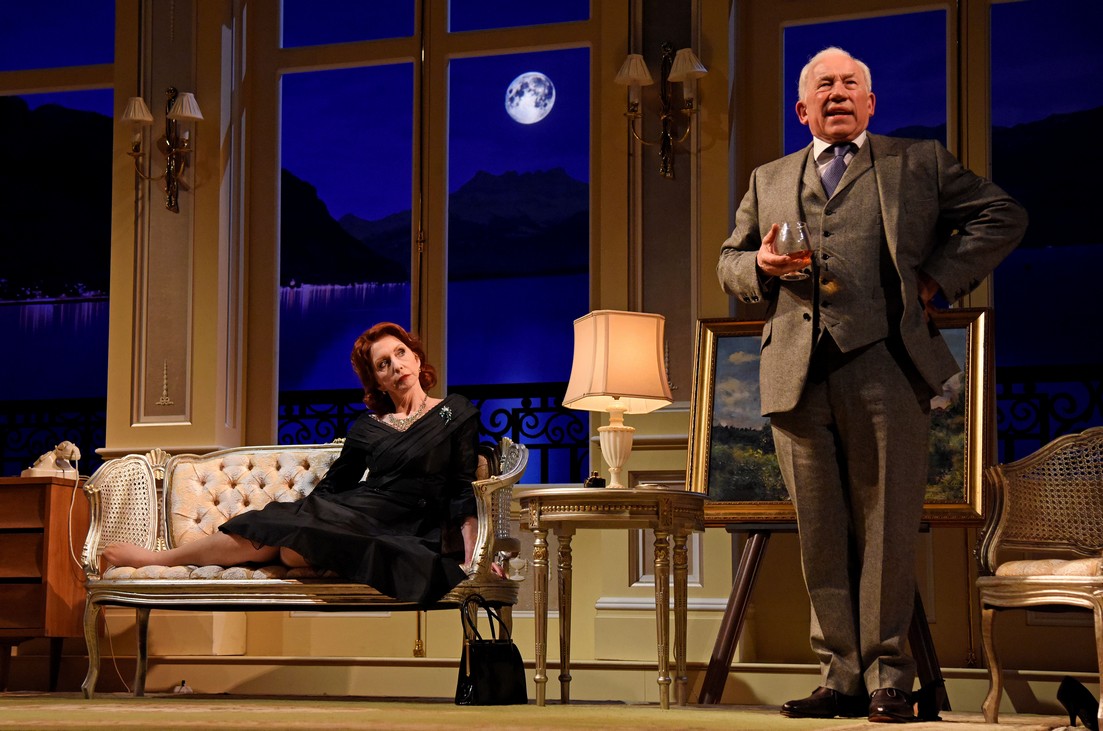
Whenever we consider Coward’s work we have to remember that, whereas today being bisexual is likely to add lustre to one’s reputation, when he was in his pomp and even in the sixties when this was written, being publicly exposed as gay would have entailed an excoriating disapprobation, if not by a gradually liberalizing public, then a stubbornly conservative and hypocritical press. The play is looking back to a time when such revelations – if indeed the press could bring itself to mention such things – would have been anathema to someone so flamboyantly in the public eye.
An old lover, Carlotta (Jane Asher) a successful though second rank actress, comes back into the life of Hugo Latymer (Simon Callow) a fêted writer who now lives with his German wife, Hilde (Jessica Turner) in a swish lakeside hotel somewhere in Europe. However Carlotta’s purpose is not to fan the embers or indeed to rebuke, but to seek permission to use love letters written by Hugo to her in a new autobiography she is penning.
Written with a certain amount of sentimentality around a lost love the play offers us false trails; is it about rekindled passion, perhaps in an open relationship, or then is it about past indiscretion, a coming home to roost of an abuse of authority or position? It eventually turns out to be a wistful contemplation on a secret love affair. Indeed the central weakness of the play is that it does take a while to develop its theme and the first act seems to wander aimlessly through reflections on being a famous writer, the process of ageing and some tittle-tattle about the past.
Familiar Coward tropes abound in a world where friends and acquaintances enjoy easy epithets such as; so and so is a ‘brilliant’ writer, or a ‘brilliant’ art critic or painter. Easy because they are not earned by anything we see. Indeed much of the talk in the first act is about those absent in one way or another.
The three central characters are clearly drawn though without giving too much away about their inner workings, a defect rendered less obvious by detailed and sympathetic performances. Ms Turner, practical and devoted, wearing lightly the stereotype of Teutonic brisk efficiency which she moulds into a caring, rounded individual, giving a portrait of a plain elegance of character -matched her unfussy costume.
Jane Asher is effortlessly ageless. At times she assumes a coquettish flamboyance, which offers a tasty sherry trifle in contrast to Hilde’s Bath Oliver. She is a blackmailer manqué who is nonetheless successful in her purpose having first gone flaky and returned the love letters written by Hugo, not to her, but to the male love of his life, a certain Perry Sheldon.
The piece doesn’t quite hit the heights, precisely because it is so well dressed, so well behaved with its emotions for the most part kept in check and channelled under cover of wit into less turbulent tributaries, a task to which Simon Callow fruitfully bends his energies and talents. The result is touching if not quite moving as Mr Callow is not given enough – except some self-righteous bluster about rights and confidentiality – to get his dramatic teeth into.
Our final analysis of the play’s tone must be one of melancholy, which only needs the slow movement of Elgar’s cello concerto to describe the mood. The Theatre Royal production is worth seeing for the individual performances alone. As for the reason the play is not more often revived, the evidence is there for all to see. ★★★☆☆ Graham Wyles 20th February 2019

